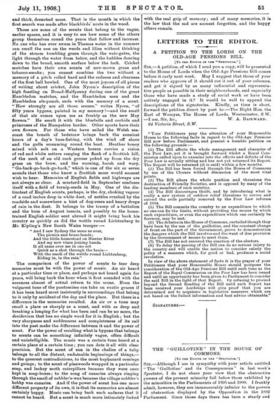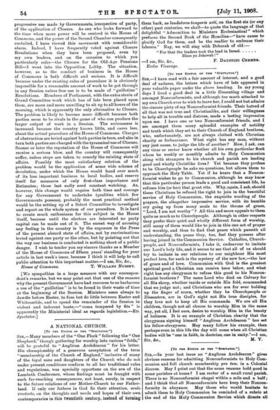THE " GUILLOTINE " IN THE HOUSE OF COMMONS.
pro THE EDITOR OE THE "SPECTATOR."] SIR,—Although I am in sympathy with your article entitled "The Guillotine' and its Consequences" in last week's Spectator, I do not share your view that the obstructive powers of the present minority fall below those exhibited by the minorities in the Parliaments of 1895 and 1900. I frankly admit, however, they are immeasurably inferior to the powers of obstruction displayed by the Opposition in the 1892 Parliament. Since those days there has been a steady and
progressive use made by Governments, irrespective of party, of the application of Closure. As one who looks forward to the time when more power will be centred in the House of Commons, and the power of the Second Chamber consequently curtailed, I have viewed this movement with considerable alarm. Indeed, I have frequently voted against Closure Resolutions when they have been proposed, even by my own leaders, and on the occasion to which you particularly refer—the Closure for the Old-Age Pensions Bill—I went into the Opposition Lobby. The situation, however, as to the conduct of business in the House of Commons is both difficult and serious. It is difficult because under the existing rules of procedure it is obviously impossible for a reasonable amount of work to be got through in any Session unless free use is to be made of "guillotine" Resolutions. Members of Parliament, with the extra strain of Grand Committee work which has of late been placed upon them, are more and more unwilling to sit up to all hours of the morning, which is apparently the only alternative to Closure. The problem is likely to become more difficult because both parties seem to be rivals in the game of who can produce the larger output of work in a Session. The seriousness is increased because the country knows little, and cares less, about the actual procedure of the House of Commons. Charges of obstruction are levied against both parties in turn, and also in turn both parties are charged with the tyrannical use of Closure. Sooner or later the reputation of the House of Commons will receive a serious blow, and the country will consequently suffer, unless steps are taken to remedy the existing state of affairs. Possibly the most satisfactory solution of the problem would be the application of some wide scheme of devolution, under which the House would hand over much of its less important business to local bodies, and reserve itself for measures of only first-class importance and Estimates ; these last sadly need constant watching. As, however, this change would require both time and courage for any Government to undertake (qualities which few Governments possess), probably the most practical method would be the setting up of a Select Committee to investigate and report on the whole system of our procedure. It is hard to create much enthusiasm for this subject in the House itself, because until the electors are interested no party capital can be made out of it. The surest way of arousing any feeling in the country is by the exposure in the Press of the present absurd state of affairs, not by recriminations levied against one party or the other, but by pointing out that the way our business is conducted is nothing short of a public danger. I wish to tender you my sincere thanks as a Member of the House of Commons of fifteen years' standing for your article in last week's issue, because I think it will help to call public attention to this important matter.—I am, Sir, &a., [We sympathise in a large measure with our correspon- dent's remarks, but we may point out that one of the reasons why the present Government have had recourse to so barbarous a use of the " guillotine " is to be found in their waste of time at the beginning of the Session. Ministers seem always to dawdle before Easter, to fuss but do little between Easter and Whitsuntide, and to spend the remainder of the Session in violent and indecent haste,—" coma tempered by fits" is apparently the Ministerial ideal as regards legislation.—En. Spectator.]







































 Previous page
Previous page